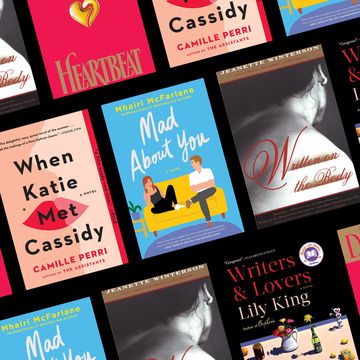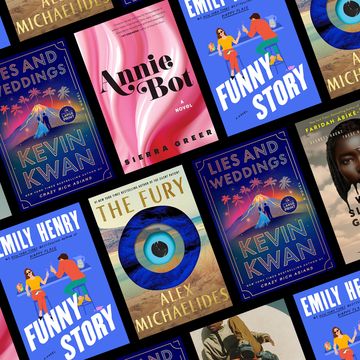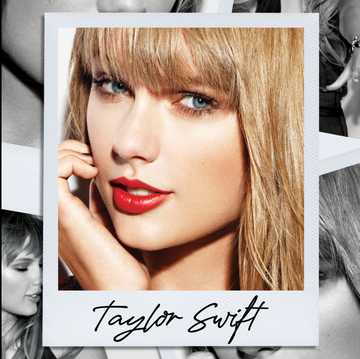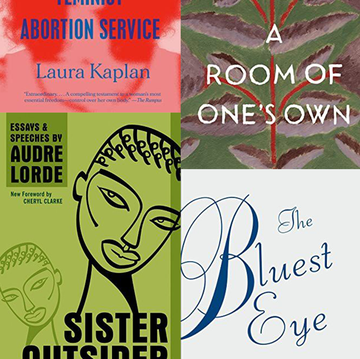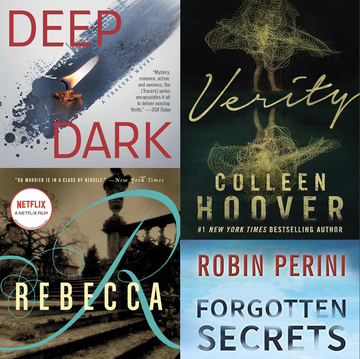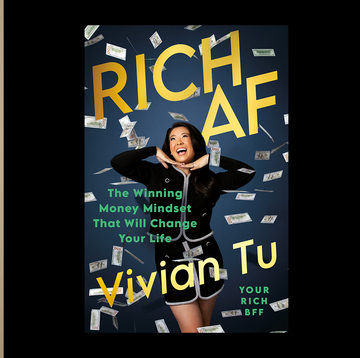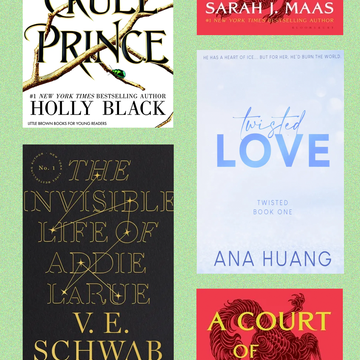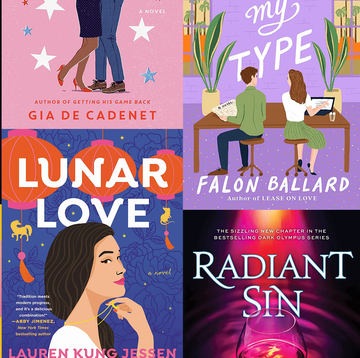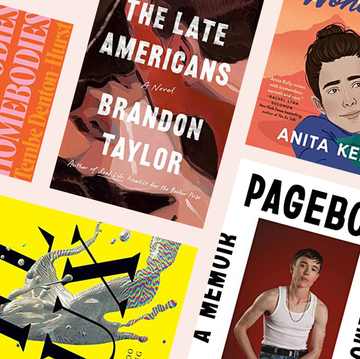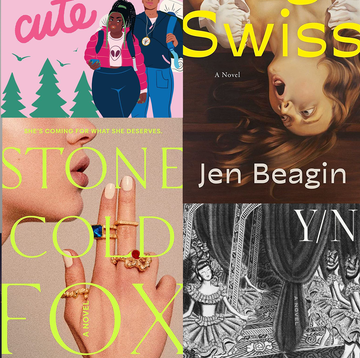I realize an empty apartment, a bag of new hardcovers and a cold bottle of Sauvignon Blanc isn't everyone's idea of the perfect Friday night. So for those of you who don't think reading is more fun than hanging around some loud, crowded bar, I've compiled a list of foolproof reasons why you need to start reading more, like, yesterday. And for my fellow book nerds who need no convincing? Now you have more ammunition for next time your friends try to drag you out of your house before you're done with The Goldfinch.
1. It makes you more empathetic.
This is the most important reason of all. In his now-famous Kenyon College commencement address, David Foster Wallace argues that a liberal arts education, the foundation of which requires reading a lot of literature, makes you a kinder, more empathetic person.
When you read, you replace your own life with someone else's. That is an act of empathy, and empathy is the cornerstone of human connection. Empathy will make you a better friend, a better lover, a better employee, a better sister, a better child — it will make you a better everything.
My favorite quote from DFW's speech demonstrates this point: "But most days, if you're aware enough to give yourself a choice, you can choose to look differently at this fat, dead-eyed, over-made-up lady who just screamed at her kid in the checkout line. Maybe she's not usually like this. Maybe she's been up three straight nights holding the hand of a husband who is dying of bone cancer. Or maybe this very lady is the low-wage clerk at the motor vehicle department, who just yesterday helped your spouse resolve a horrific, infuriating, red-tape problem through some small act of bureaucratic kindness … if you really learn how to pay attention, you will know there are other options. It will actually be within your power to experience a crowded, hot, slow, consumer-hell type situation as not only meaningful, but sacred, on fire with the same force that made the stars: love, fellowship, the mystical oneness of all things deep down."
Here's full-text of DFW's speech. Try not to cry.
2. Books force you to concentrate.
Sometimes, after a slow day at the office, I find myself suffering from Internet brain. I ping-pong from site to site, refreshing my Twitter and Facebook feeds, desperate for the tiny endorphin hit of a funny status or a retweet. After too many hours online, my brain gets almost itchy — probably from spending so much time with my attention scattered in a million different places. The perfect antidote? Curling up with a book. It can be a little hard to focus your mind at first, but once you get sucked in, I promise that itchy feeling will fade away. There is nothing passive about reading, even if you're in pajamas on the couch while you're turning those pages. Every sentence is like a push-up for your brain.
3. It will make you more fun to talk to.
I was once at a dinner party where everyone was complaining about how they can't remember anything anymore because the Internet makes our brains so goddamn itchy. My friend, a prolific nonfiction reader, chimed in, but instead of adding another story about how she forgot to feed her cat or left her phone in a cab, she told the table about a book she was reading by Joshua Foer, called Moonwalking With Einstein. In the book, Foer describes how he became the memory champion of the United States by creating imaginary memory-palaces where he "stored" his memories. Her anecdote, which was about 4 million times more interesting than our communal bitch-fest, transformed the conversation into an epic version of that I'm-going-on-a-picnic memory game we all used to play on childhood road trips. The more you read and the more widely you read, the more you'll be surprised how much you have to say (and how much people want to listen).
4. It improves your spelling, grammar, and vocabulary.
Is anything a bigger turnoff than someone who can't spell? Last weekend my hairdresser had me howling with horrified laughter when she showed me a barrage of texts from a guy trying to woo her — a guy who didn't know the difference between there and their and who spelled super S-O-P-E-R.
"Are you sure it's not just a typo?" I asked.
"I wish," she said, scrolling to at least six other texts with the same misspelling. And that wasn't all — the dude spelled panda wrong.
Though poor spelling is forgivable in certain cases, there's nothing better than a grammatically correct, smartly punctuated, and uniquely worded love letter/email/text. Reading is the best way to absorb all those tricky grammatical rules — if you read enough, graceful communication will become second nature. Need proof? Check out this study by Berkeley scientists, or this one at LD OnLine, a resource for learning disabilities and ADHD.
5. It helps you relax.
What's your No. 1 de-stressing tactic? A glass of white wine? A two-hour yoga class? Deep-breathing? Your ocean screen-saver? Sex? A nighttime cup of chamomile? Destroying villains on your PlayStation 3? Binge-watching Grey's Anatomy?
That's all well and good. The more de-stress techniques the better. But according to neuropsychologists at the University of Sussex, reading a book blows all your other chillax strategies out of the water. A group of brave volunteers were subjected to tests designed to raise their heart rate and generally stress them out. Then scientists exposed them to a variety of common relaxation methods — a long walk, a cup of something warm to drink, video games, music, etc. Just six minutes of reading reduced their stress levels by 68 percent — that's leaps and bounds better than every other method they tried. Next time you need to unwind, turn off the TV and open a book. It even eases muscle tension.
6. It might make you better at MATH.
This research actually blew my mind. I thought reading was to blame for my universally crappy math grades. I used to hide Vonnegut novels in my Algebra II textbook and read for the entire class period. Divvying up a restaurant bill has given me a panic attack. But according to the Guardian, the British Cohort Study found that kids who read for pleasure have universally higher test scores than kids who don't, in all areas — including math. The increase was so significant it led the researchers to conclude that the way a kid reads has a bigger impact on test scores than whether his or her parents have a post-secondary degree. Crazy. Also, thanks, British Cohort Study. Now I have no excuse for the fact that math makes me want to cry.
7. It keeps your brain healthy and staves off Alzheimer's.
I recently read an unnerving article in the New York Times about how advances in medical science and better treatment for common killers like lung and heart disease are increasing life expectancies. That's not the scary part — the scary part is that longer life spans mean more people will suffer from Alzheimer's and cancer, two illnesses that afflict aged cells.
It's not too early to start reducing your Alzheimer's risk. Aside from a healthy lifestyle, one of the best things you can do to stay sharp is engage in brain-boosting activities. Reading is at the top of the list. In fact, a study published in Neurology suggests that vigorous mental activity — like reading — slows age-related cognitive decline.
8. Reading is a cheap way to expand your horizons.
Prisons, hospitals, waiting rooms — have you ever noticed that places where people get stuck are always well-stocked with reading material?
I grew up with a single mom in rural Northern Michigan, an hour and a half drive from the nearest shopping mall. But by the time I was 13, I'd been a student at Hogwarts, an adulterous wife stifled by my doctor husband, a South African orphan with a dream of becoming a boxing champion, and the daughter of a missionary in the Congo. No matter where you are, a book is a door that opens into another life. If you're a bored and lonely teenager, trapped in a dead-end town and surrounded by people who don't understand you, it's an escape hatch. If you're a curious adult, it's a chance to travel the world for no more than the price of a Kindle download or a paperback. Or hit up the library to globe-trot for free.
9. Because, you guys, IT IS FUN.
Don't let horrible memories of high school English class convince you that reading isn't fun. There's a really charming excerpt on Huffington Post from Wendy Lesser's Why I Read: The Serious Pleasure of Books, a conversational tour through her reading history that's also a reminder about the quiet joy of losing yourself in language.
"When it comes to literature, we are all groping in the dark, even the writer. Especially the writer. And that is a good thing — maybe one of the best things about literature. It's always an adventure of some kind. Even the second or third or tenth time you read it, a book can surprise you, and to discover a new writer you love is like discovering a country."
10. Because everyone has a thing for sexy librarians.
I am very, very nearsighted — so nearsighted that even the ultra high-index lenses in my glasses are coke-bottle thick. I'm kind of self-conscious about how small my eyes look when I wear my glasses, and as a result, I wasn't confident enough to wear them out in public until I turned 25 and reached the glorious fuck-it stage of life. The weird thing? With my glasses on, guys check me out more, and I am not one of those lucky freaks who look really good in goggles. Also, my glasses are HUGE. And yet I swear to you — if I wear my glasses to a bar, I'm way more likely to get hit on.
I consulted my dude friends about this phenomenon, and they unanimously agreed that glasses are sexy because glasses are associated with books, and books are associated with smart people, and smart brains are sexy. Works for me. It's kind of hard to definitively prove this one, but judging by the volume of steamy librarian porn out there, plus Tumblr accounts like Hot Guys Reading Books and its counterpart, Hot Girls Reading Books — I think it's safe to say that a lot of people find glasses-wearing, bookwormy smarty-pants pretty hot. There's even a dating site that matches people up according to their taste in literature. I bet you my nerdy firstborn that Alikewise creates longer-lasting matches than OkCupid.
11. It teaches you how to read minds.
A few months ago, the Internet was all aflutter about a study published by social psychologists at the New School who discovered that reading literary fiction improved people's ability to interpret social cues. Subjects who read literary fiction (authors like Alice Munro, Charles Dickens, and F. Scott Fitzgerald) for five to ten minutes demonstrated a higher ability to understand others' mental states.
Why is this important, and how will it help you be a kinder, more thoughtful and socially fluent version of yourself? Because the literary-fiction readers aced tests that measured Theory of Mind, defined by the researchers as the ability to understand others' mental states. Essentially, the study measured each subject's mind-reading skills. Could they pick up a flicker of sadness betrayed by a slow-to-bloom smile? Or realize that a coworker's noisy exhale means they've been talking about their cat for too long? After engaging in the kind of reading that demands attention and interpretation, people were significantly better at putting themselves in another's shoes. This gets back to what David Foster Wallace was saying in his speech.
12. Because being a sharp and prolific reader might help you land, and succeed, at your job.
There are a ton of scary articles out there about how low literacy rates contribute to things like early incarceration, unemployment, and even health problems. But the happy inverse of that problem is that high literacy is a skill that will benefit you in every aspect of your life — and particularly in the workplace, where the ability to communicate effectively is one of the top skills employers look for in new hires. Check out this list on Forbes.com — reading more will make you stronger in almost every area.
When you tackle a literary novel like David Copperfield, you're doing half the work — Charles Dickens provides the text, but your imagination provides the scene. In other words, you problem-solve. You anticipate. You infer things about characters based on details. You and the author, during the course of the book, are a team. So what are you waiting for? Go read. Your life will thank you by becoming even more awesome.
Follow Julie on Twitter.
Photo Credit: Walt Disney Pictures


